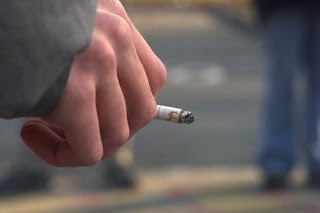
Fewer smokers is bad news for California's budget. A major bond rating agency sounded an alarm this month, saying the state may have borrowed more than $4 billion against settlement money that might never materialize.
A little more than a decade ago, 46 state attorneys general reached a settlement with the four biggest tobacco companies. The companies agreed to pay an estimated $246 billion over a 25-year period to compensate states for tobacco-related health care costs. But there is one quirk: The settlement payments are not fixed, but linked to tobacco sales.
Rather than waiting for annual payments, the state and some local governments decided to borrow money against their anticipated future revenue. All told, they've issued $16 billion in bonds since 2001.
Major bond rating agencies and some municipal finance experts have warned for years that the number of smokers was decreasing more rapidly than expected.
In December, California had to dip into its reserves to cover bond payments. Dick Larkin, director of credit analysis at Herbert J. Sims & Co., said there were two reasons: fewer smokers and a dispute with the tobacco companies that has resulted in delayed payments.
As the state's finances worsened, officials went back to investors. In 2007, California issued $4.4 billion in tobacco bonds. In order to pay back investors by 2047, it assumes that cigarette consumption will decline by about 1.8 percent per year, according to bond filings. But in the midst of increased taxes and antismoking laws, sales have dropped more quickly than predicted. As a result of the decline and the ongoing dispute with the tobacco companies, annual payments have been less than expected since the settlement was signed in 1998, according to Larkin.
If the bonds default, it wouldn't be bad just for investors. California is one of only a few states that guaranteed a portion of its bonds with general fund revenue. If tobacco settlement money does not cover the debt, the state will have to pick up some of the tab. There are currently $2.9 billion in bonds outstanding that are backed by a state guarantee, according to the state treasurer's office.
Although that payment would be subject to legislative approval, it's unlikely it wouldn't be approved.
"No one would trust California anymore," Larkin said. "Their name would be mud in the market."
Unlike most other states, California split its settlement revenue between the state and local agencies -- counties and four major cities, including Los Angeles, San Diego, San Jose and San Francisco. Local governments receive about half of the state's settlement payments.
Some local officials have elected to borrow against expected future payments but haven't guaranteed to cover their debt with general fund revenue. While this could be bad news for investors, it might actually be good news for communities.
"The investor really has a slightly different view on everything," said Peter Bianchini, senior municipal strategist at Mesirow Financial. Local governments aren't on the hook if the tobacco settlement revenue doesn't come through, so they may have been able to borrow more than they would have received if they had waited for the annual payments, he said.






